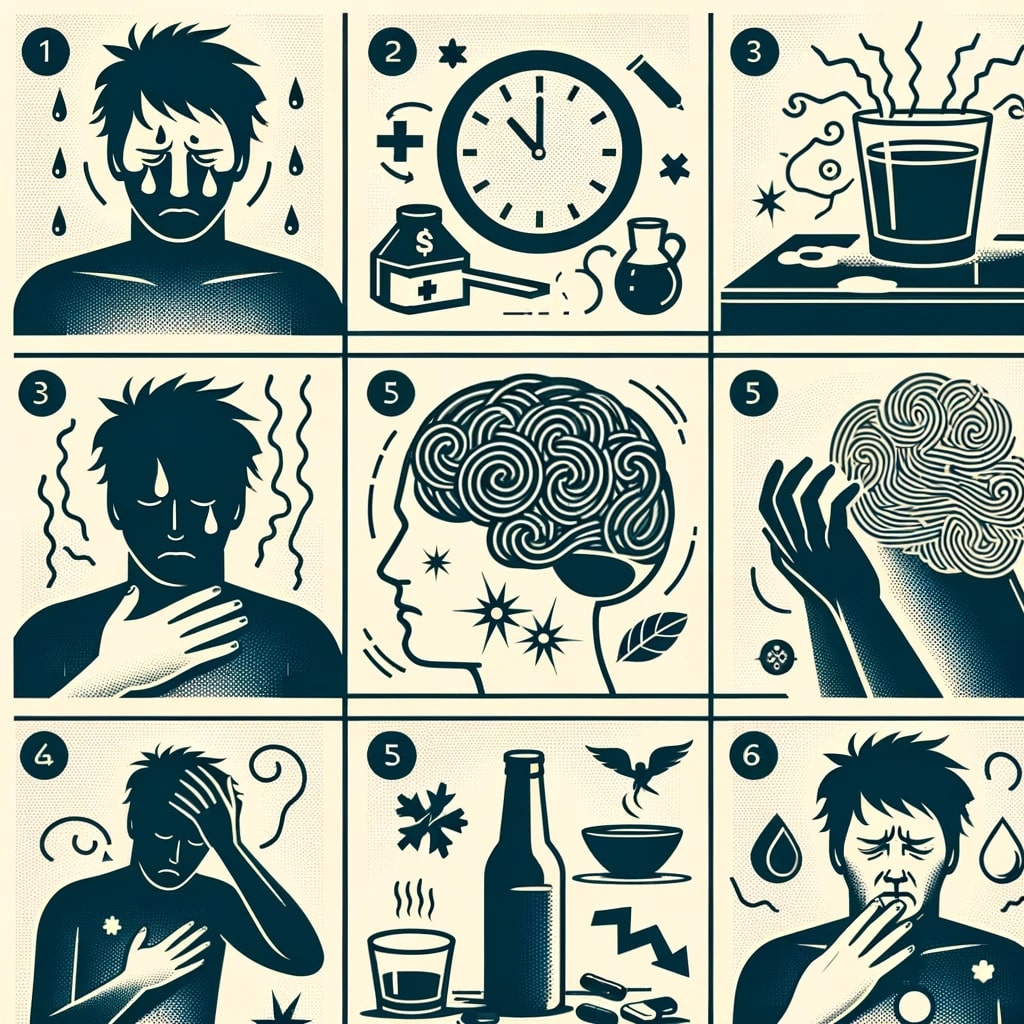COMPREHENSIVE GUIDE TO ALCOHOL DETOX & WITHDRAWAL: SYMPTOMS TIMELINE TREATMENT
Navigate the complex world of alcohol detoxification, understand the withdrawal symptoms, and get informed on safe recovery methods.
Table of Contents
- What is Alcohol Dependence & Alcohol Withdrawal?
- Why Does Alcohol Withdrawal Occur?
- Symptoms of Alcohol Withdrawal
- Alcohol Withdrawal Symptoms Timeline
- Alcohol Detox & Withdrawal Treatment
- Tips for Safe Detoxification
- Overcoming Alcohol Withdrawal
- FAQs on Alcohol Detox & Withdrawal
- Further Reading on Alcohol Detox & Withdrawal
What is Alcohol Dependence & Alcohol Tolerance?
- Dependence. Over time and with regular heavy drinking, the body becomes dependent on alcohol to function normally. The central nervous system adjusts to having alcohol present, and when alcohol levels drop, the body reacts, leading to withdrawal symptoms.
- Tolerance. As a person drinks more frequently, they may need to consume more alcohol to achieve the same effects. This increased tolerance can lead to greater consumption and an increased risk of withdrawal symptoms when not drinking.
Alcoholism, or alcohol use disorder, refers to the compulsive need to consume alcohol despite its negative effects on health and social life. Over time, increased quantities may be needed to achieve the same effect, leading to increased consumption.
Why Does Alcohol Withdrawal Occur?
When someone who has been drinking heavily and regularly stops drinking or significantly reduces their alcohol intake, they may experience alcohol detox and withdrawal symptoms. These symptoms are the result of the body trying to adjust to the absence of alcohol, which it had become accustomed to.
Symptoms of Alcohol Withdrawal
Physical Symptoms
- Shaking
- Sweating
- Nausea
- Headache
- Elevated heart rate
- Seizures
Emotional Symptoms
- Anxiety
- Depression
- Irritability
- Mood swings
Cognitive Symptoms
- Confusion
- Hallucinations
- Nightmares
 Alcohol Withdrawal Symptoms Timeline
Alcohol Withdrawal Symptoms Timeline
This timeline provides a general overview, but the exact timing, intensity, and duration of withdrawal symptoms can vary widely among individuals. Factors such as the amount and frequency of drinking, individual health, age, and prior history of withdrawal episodes can influence the withdrawal process. It’s essential for anyone considering stopping alcohol intake to consult with a medical professional and be aware of the potential risks and complications.
6-12 Hours After Last Drink (mild symptoms begin)
- Tremors (shaky hands or body)
- Anxiety or nervousness
- Irritability
- Fatigue
- Mood swings
- Nightmares or vivid dreams
- Insomnia or difficulty sleeping
- Headache
- Sweating or clammy skin
- Nausea or vomiting
- Loss of appetite
- Rapid heartbeat
12-24 Hours After Last Drink (continuation of mild symptoms/possible onset of moderate symptoms)
- Disorientation or confusion
- Increased blood pressure
- Irregular heart rate
- Fever
- Excessively sweating
- Rapid breathing
- Mood disturbances
- Sensitivity to light, sound, or touch
- Tremors affecting larger parts of the body or whole-body tremors
24-48 Hours After Last Drink (mild to moderate symptoms continue or peak)
- Risk of seizures increases
48-72 Hours After Last Drink (potential onset of severe symptoms)
- Delirium Tremens or DTs
- Severe confusion and agitation
- Hallucinations
- Fever
- Seizures
- Severe tremors
- Irregular heartbeat
- Intense sweating
- High blood pressure
- Psychological symptoms become more pronounced
- Depression
- Anxiety
- Strong cravings for alcohol
- Difficulty thinking clearly
- Reduced attention or concentration
5-7 Days After Last Drink
- Most physical symptoms start to fade, but some mild symptoms like mood disturbances and sleep problems may linger
- Psychological symptoms like cravings, depression, and anxiety can continue and may need further treatment
Several Weeks After Last Drink
For some individuals, especially those with a long history of heavy drinking, post-acute withdrawal syndrome (PAWS) can manifest, causing ongoing psychological and mood-related symptoms. These might include
- Anxiety
- Irritability
- Mood swings
- Insomnia
- Fatigue
- Reduced attention or concentration
 Alcohol Detox & Withdrawal Treatment
Alcohol Detox & Withdrawal Treatment
Medical Detox
Supervised detoxification process that takes place in a specialized medical facility or hospital. Provides a safe environment where patients can be closely monitored.
Reasons for Medical Detox
- History of heavy and prolonged drinking
- Previous experiences with severe withdrawal symptoms or delirium tremens
- Presence of co-occurring mental or medical health conditions.
- Lack of a stable or supportive home environment.
Benefits
- Continuous medical supervision to ensure safety
- Immediate response in case of complications or severe symptoms
- Administering of medications to alleviate symptoms
- Nutrition and hydration support if required
- Duration: Typically lasts between 5 to 7 days, but can vary based on individual needs
Outpatient Detox
Detox process that allows the individual to stay at home while receiving treatment. Requires regular check-ins with healthcare professionals.
Suitability
- For individuals with a milder form of alcohol dependence
- Those who have a supportive and safe home environment
- Individuals without a history of severe withdrawal symptoms
Benefits
- Greater flexibility and ability to maintain daily routines
- Often less expensive than inpatient treatment
- Can provide a sense of autonomy and empowerment
Considerations
- Regular medical check-ups are necessary
- Individuals must remain abstinent during the process
- Availability of immediate medical support is essential in case symptoms intensify
Medications for Alcohol Detox & Withdrawal
Benzodiazepines
Commonly used due to their sedative properties and ability to prevent seizures. Examples include
- Diazepam (Valium)
- Chlordiazepoxide (Librium)
- Lorazepam (Ativan)
- Oxazepam (Serax)
Antipsychotics
Can help manage severe agitation or psychosis. However, it’s important to monitor for potential side effects, especially if used alongside benzodiazepines Examples include
- Haloperidol (Haldol)
Anticonvulsants
Used as an alternative or in combination with benzodiazepines to manage withdrawal symptoms and prevent seizures. Examples include
- Carbamazepine (Tegretol)
- Valproate (Depakote)
Beta-blockers
Can help manage some of the physical symptoms. Examples include
- Propranolol
Alpha-adrenergic agonists
Can reduce withdrawal symptom severity in some cases. Examples include
- Clonidine
Naltrexone (Vivitrol)
Used post-detox to reduce cravings and the risk of relapse.
Tips for Safe Detoxification
- Always consult with a healthcare provider before beginning detox
- Do not attempt to detox alone, especially if the dependence is severe
- Stay hydrated and maintain proper nutrition
- Create a support system of friends or family aware of your detox journey
Overcoming Alcohol Withdrawal
Understanding the intricacies of alcohol detox and withdrawal is paramount for anyone seeking to embark on the path to recovery. Acknowledging the range of symptoms, the potential timeline, and the importance of seeking appropriate medical supervision and support can make a profound difference in the journey towards sobriety.
Remember, each individual’s experience may vary, but with the right resources and a comprehensive treatment plan, the daunting process of alcohol detox can be navigated with resilience and the promise of a healthier, alcohol-free future.
